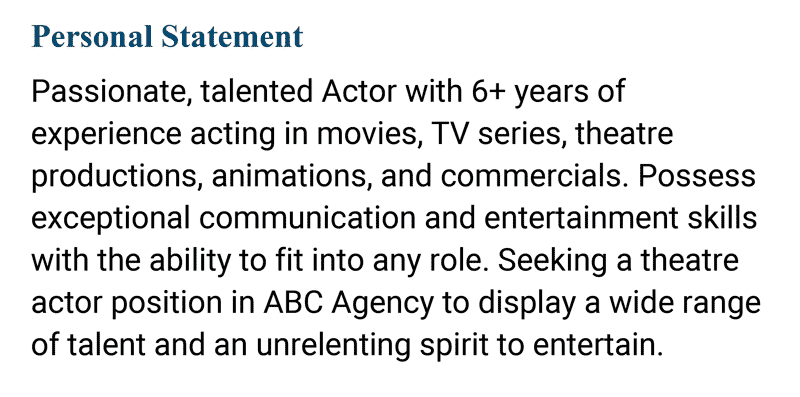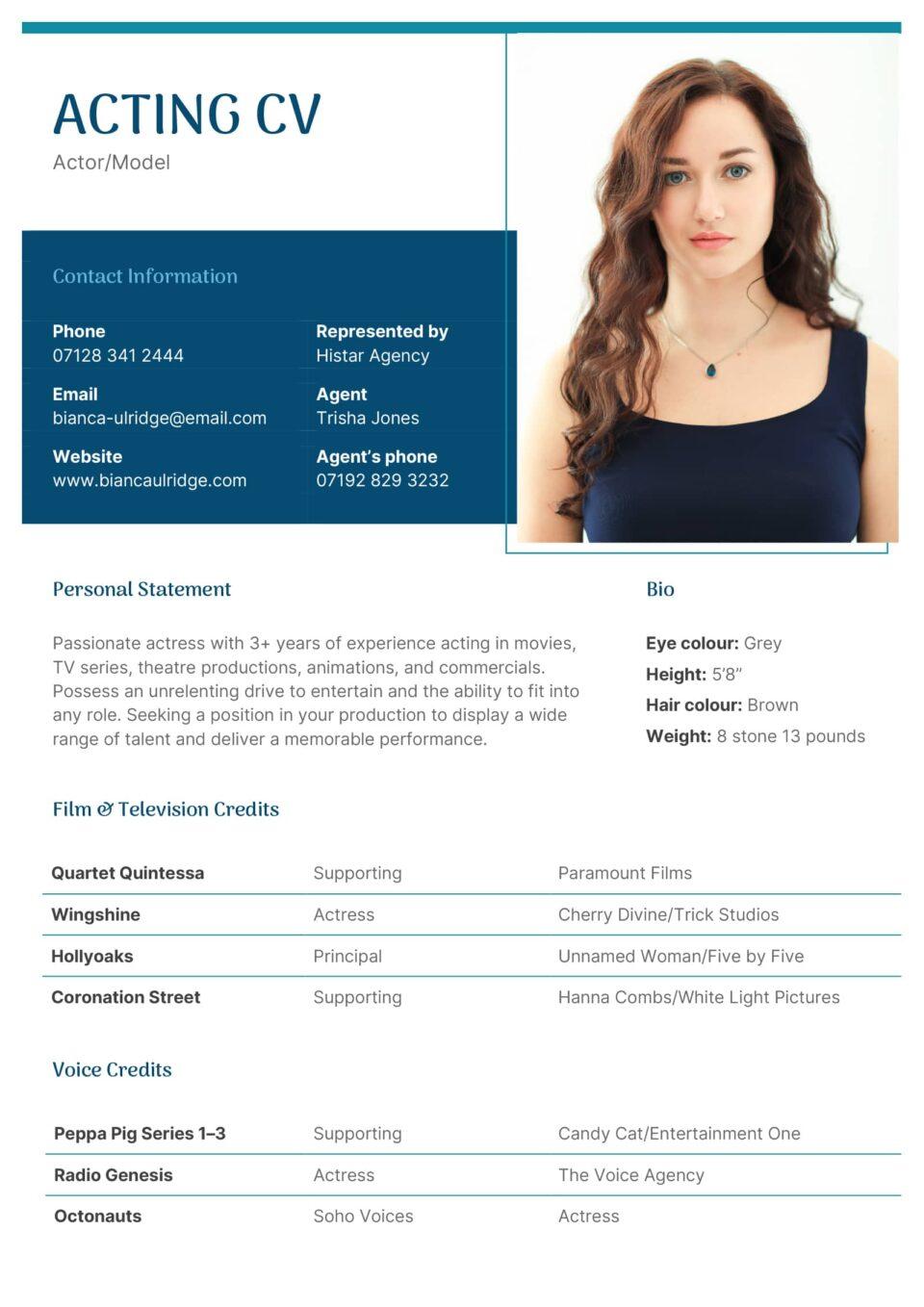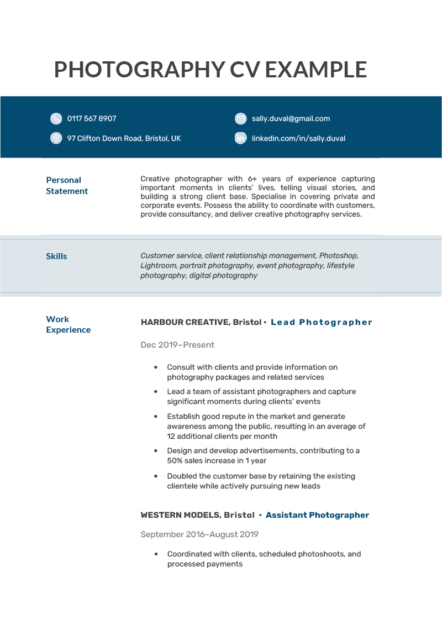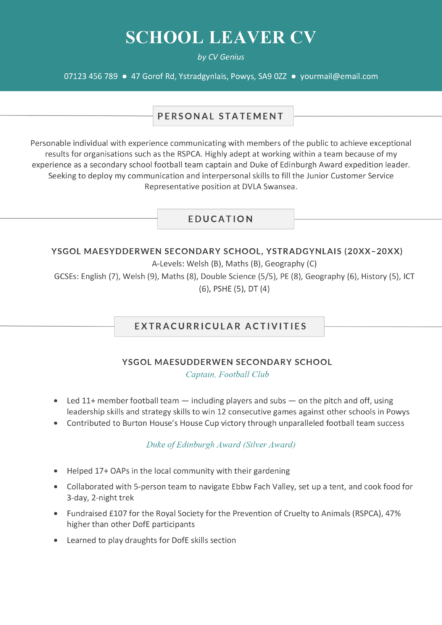Ensure your CV layout is structured to best highlight your unique experience and life situation.
Acting CV Template (Text Format)
PERSONAL STATEMENT
Passionate actress with 3+ years of experience acting in movies, TV series, theatre productions, animations, and commercials. Possess an unrelenting drive to entertain and the ability to fit into any role. Seeking a position in your production to display a wide range of talent and deliver a memorable performance.
FILM & TELEVISION CREDITS
Quartet Quintessa
Supporting | Paramount Films
Wingshine
Actress | Cherry Divine/Trick Studios
Hollyoaks
Principal | Unnamed Woman/Five by Five
Coronation Street
Supporting | Hanna Combs/White Light Pictures
VOICE CREDITS
Peppa Pig Series 1–3
Supporting | Candy Cat/Entertainment One
Radio Genesis
Actress | The Voice Agency
Octonauts
Actress | Soho Voices
EDUCATION
Northumbria University, Newcastle upon Tyne | 20XX–20XX
BA (Hons) Theatre and Performance — Upper second-class honours (2:1)
Gosforth High School, Newcastle upon Tyne | 20XX–20XX
- A-Levels: Business Studies (B), History (C)
- GCSEs: 10 A*–C, including English, Maths, and ICT
SPECIAL SKILLS
- Fluent in French
- Conversational in German
- Improvisation and comedy
- Voiceovers and radio experience
- Accents: American, Scouse, Geordie, Mackem, German, French, Pitmatic
HOBBIES & INTERESTS
- Skating
- Attending book readings
- Writing poetry
- Vlogging
How to write an acting CV
Before you begin writing, make sure you know how to write a CV in a way that best emphasises your strengths.
First impressions count, especially in the world of acting. Your acting CV needs to catch the casting director’s eye by displaying your skills, previous experience, workshops, training, and educational background.
Here are three essential tips for constructing an award-winning acting CV:
1. Open with an eye-catching acting CV personal statement
Creating a personal statement that’ll immediately impress casting directors can help you win an audition. A CV personal statement is a short paragraph at the top of your acting CV that introduces you to the recruiter and says why you’re the right person for the role.
Your acting CV personal statement should contain a brief summary of your:
- professional experience
- educational background
- key skills and accomplishments
- career goals
Keep in mind that the acting career goals you mention must line up with the position in the job advert. Mentioning the name of the acting agency or organisation will also let your recruiter know you understand the company’s requirements.
Here’s an example of a great acting CV personal statement:

2. Choose the optimal acting CV format
Delivery is everything, and using effective formatting for your acting CV conveys your content to the casting director in the best possible way.
Remember to keep your acting CV format clear and simple. The best font for your CV is professional and easy to read, so use fonts like Arial, Times New Roman, or Verdana and an appropriate size (e.g., 10–12 for body text, 13–14 for headers) to make it easy for the employer to read.
The top part of your acting CV should have the information the casting director wants the most. So include your contact details (or those of your agent) above your personal statement, and provide a list of your physical attributes like your:
- height
- weight
- hair colour
- eye colour
Your acting CV should also include a professional headshot to ensure you make a significant impression on the casting director and show that you fit their needs.
Even if you aren’t the right fit for the role, directors may remember you when casting for roles that match your look.
Attach your headshot to the back of your acting CV to prevent it from being accidentally separated. If you’re submitting your application electronically, include your photo on a CV header.
And when it comes to listing your acting experience, a chronological CV format is best if you’re an accomplished actor. This format starts with your most recent roles and works backwards.
As shown in our acting CV example, showcasing your most recent work first gives your recruiter a positive impression of your current abilities and achievements.
On the other hand, if you’re new to the acting industry, feature your education, training, and relevant skills higher up on your CV. You can also list parts you’ve played in amateur productions, as they contribute to your experience.
Using a pre-formatted CV template with a photo can save you time so you can focus on presenting your experience and skills. If saving time is your top priority, you can also create a CV using a builder — your CV will be ready in minutes. Complete your application by using a cover letter builder.
3. Highlight your acting CV skills
Casting directors don’t just rely on your physical appearance to fill a role: they want to see a range of skills on your CV that indicate you’ll excel at the role.
Hard skills, also called technical skills, are abilities you’ve learned from formal acting training and education. Agencies look for specific technicalities from actors that show they can effectively play a character’s role.
Here are relevant hard skills you might include on your acting CV:
- Acting for film, television, and live audiences
- Memorising lines and cues
- Improvisation and comedy
- Singing and dancing
- Voiceovers and radio
- Accents and languages
- Proficiency in specific instruments or sports
- Knowledge of stage equipment safety standards
Providing details about your skills helps the casting directors see that you’re versatile enough to take on any acting scenario.
So as you’re listing your skills, always include specifics, such as your vocal range, dance genre, and the types of accents you can do.
On the other hand, soft skills are interpersonal skills that actors use when dealing with other people and their work.
Including relevant soft skills in your acting CV demonstrates how well you get along with others, which is vital to maintaining a positive dynamic on a stressful shoot. Your acting soft skills are also important for drawing an emotional reaction from your audience.
Here are relevant soft skills that will make your acting CV stand out:
- Communication skills
- Time management skills
- Interpersonal skills
- Flexibility
- Creativity
- Public speaking
- Charisma
- Stamina
Demonstrating your soft skills in your work experience bullet points shows casting directors how these abilities help you do your job well.
Here’s an example of soft skills illustrated in bullet points from an acting CV work experience section:
Examples of soft skills in an acting CV's work bullet points
- Collaborated with 100+ actors to create an ensemble or cast in a production
- Applied improvisation to adapt a performance at an impromptu campaign event, resulting in 10% increased marketing sales
- Prioritised and organised scheduled call times to ensure 100% rehearsal attendance
- Worked closely with production managers, stage crew, and stage directors
- Used confident voice projection during live public speaking
You can also include prominent personalities and institutions you’ve worked with or received training from to show you’ve been coached by one of the top names in the field.







